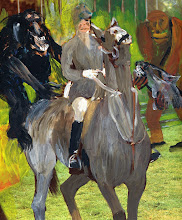I must never let them know how I feel about them. How well I know them. It is my duty; it is the story of my life. A famous general used to live in the neighborhood. The old lady in the bakery who comes and visits the legless tenant on the fourth floor assured me she knew him well. She could not tell me how it was and in what way she knew him well. Would I ever challenge such a claim, hardly in the open. She and I share her knowing of the general whether it is true or not. I don’t mind keeping their little secrets. They confide in me as they would put their pennies in a bank, every once in a while they want to see how much they have saved up. I am their landlord, which means they can look down on me. For of what bit of land is it of which I am the lord? A forgotten corner in which humans have settled who are too old, too feeble of mind and spirit, too immobile, too poor, too stingy and too bowed by circumstances to move out of it. I live among them upon occasion like lint between their toes and have no excuse like they do for still being here.
How surprised I was when I went to visit the legless tenant myself, Mrs Stock-Krause, she was telling me as usual of the time she lived in the “villa”, its photograph hung over her fake fire, some heaped up charcoal in a recess, some broken glass and a red light bulb. She lights the fire even in the middle of summer (which it was at the time). It made me hotter looking at it. I think that having had two legs amputated has deadened her sense of climate. She lived in the “villa” not with Mr Stock and not even with Mr Krause, but with a prosperous accountant who quite unusually went bankrupt. One would imagine that an accountant would be immune to such calamities. Stock-Krause sat on her red leather sofa, left over from the villa, a blanket over her stumps, looking like her legs were merely curled up under her, smoking away, although the legs had been amputated because they were ‘smoker’s legs’. Now that they are gone she sees no reason to stop. Her hair was covered by a turban made of flannel or felt, I think it was to cover baldness; I have never seen her without it or with another one. We had not always been so friendly, in fact we were not on speaking terms for at least ten years. I slammed down the receiver whenever I heard her husky voice at the other end, ordering her to “put it in writing”. She kept insisting on repairs to her flat over and beyond her just deserts. In these instances I have firm principles. More or less out of the blue, for I can recall nothing in her previous remarks which could have prompted her to digress from her saga of the villa, I combed my memory, reproaching myself for having missed the turn in her soliloquy and resigned myself to assuming there had been none – only that she had hoped to hide her devious question amidst her usual tears and lamentations – suddenly she asked me if I were not a bit lonely myself. I of course rebuffed her impertinent prying in a stern and casual voice, at the same time amazed that this piteous creature, who, if I were in the habit of feeling pity which I’m not, all pity in my view being false, my law knows no pity and my law is true, would certainly qualify as a candidate – had had the audacity to pity me. This unnatural demonstration, this slap in the face of nature, kick in the teeth of decorum, this pinching till blue of plain good taste, spurred me to an invention which has changed my life. “Why should I be lonely?”, I asked her in the most silvery of tones, “I am expecting the imminent arrival of my very distinguished friend, an Englishman, a parliamentarian, a QC, a scholar of English law and mores, in short a gentleman, a dandy, an amateur of rank and a man whose qualities would light up all the dirty windows of the block with a thousand fires.” She started coughing until I was afraid she would suffocate and I was relieved that the old lady from the bakery chose that moment to visit, letting herself in, the door of the flat being perpetually unlocked. I did not recognize her at first, because of the red smoky haze of the room and because she was wearing a very red dress, having been to a funeral and the limpness of her grey strands having been starched into an upright position at the beauty parlor. She began telling Stock-Krause what they had served in the bakery after the funeral, egg sandwiches and cream cakes, she had made the sandwiches herself. The boss had died and when she stood at his grave all lined in green mats, looking so comfortable, so like down quilts, she could have lain down with him. I bowed myself out fearing that the necessary distance between myself and my tenants, forever being eroded by their lack of breeding, had dwindled to a dangerous low.
Who does not live in fear of being ordinary? I do, I know. Sometimes I feel guilty about my tenants. Here they pay me rent and I use them for my amusement. Should it not be the other way around? Being ordinary and living in fear of the ordinary is one thing I do for them or rather they do to me. Ordinariness is catching. The very fear of being ordinary is so ordinary. Being lonely is so ordinary and if I had not feared to appear ordinary before my tenants, who should not use me to pass their time in idle thoughts, then I would not have been tricked into my fake confession. Keep the bastards at arm’s length, one might say. Easier said than done. For as the landlord of a property more likely as not to be eyed with derision, from which something as elusive as an ‘income’ could hardly be said to be forthcoming, when one is forced to be handyman, surveyor, assessor, rent collector, bookkeeper and social services – the tenants regard you as the equivalent of the dry rot behind their skirt boards. To call my property private only reminds me that no one but me would want it and I do not want it either. I just hope I might, exceeding hope, sell it all before the balconies come crashing down and I have to pay damages for loss of life and balconies.
Schopenhauer is wrong – most people are phantoms for themselves. Only the ‘Other’ is real. Desperation is a mark of natural aristocracy. I am in this respect a clean slate.
I have another confession – reading Robert Walser awakens my inborn contrariness, the natural drive away from ordinariness, meaning I can eat chips every night if I wish and still be miles above the philistine who dines on scrambled eggs, smoked salmon and champagne. Would consecrated bread still be holy even if it were mouldy? Sheer contrariness drove me to make myself ordinary, to say something Stock-Krause would understand. It was a ridiculous lie but it stuck in my head, Stock-Krause would not be likely to forget it either, seeing that she has nothing better to do when not mourning her alleged lost riches. Still they look upon me as their capital – if something happens to me the roof over their head would be in jeopardy, their routine inquiries after my well-being have only this significance. Without me this simulacrum of property would vanish altogether.

















.jpg)














No comments:
Post a Comment